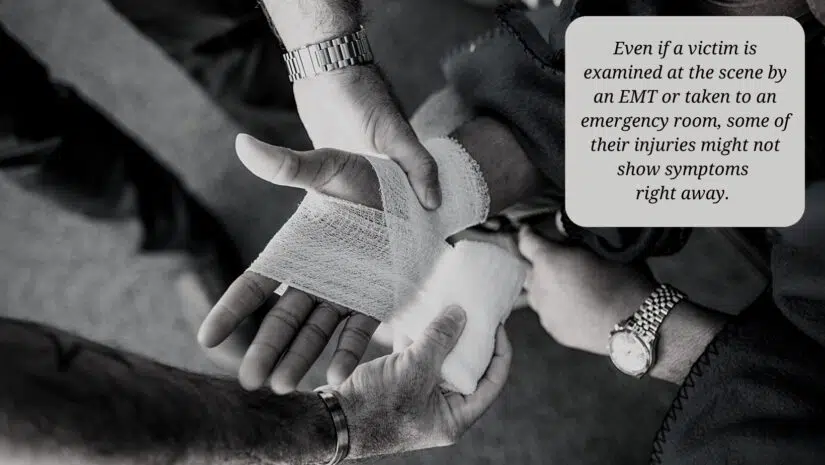Can it Take a While to Feel Pain After a Car Accident?

Common advice after a car accident is to seek medical help right away. But a car accident injury might not be obvious right away. This could lead people to refuse treatment at the scene, or even thereafter, thinking that “they are fine.”
So what happens if there is a delayed injury? Can a victim get compensation for pain and injury that happens hours, days, or even weeks after a crash?
There are several reasons why a victim might appear unharmed at first, only to start feeling pain later. In these cases, it is sometimes difficult to prove that the injury was from the accident and not something else. But with the right documentation and the help of an experienced personal injury attorney, there can be full compensation for the injury.
6 Common Car Accident Injuries and Their Symptoms
A person can experience shock, stress, and fear in a car crash. This releases a shot of adrenaline into the body which dilates blood vessels and air passages and increases blood pressure and heart rate. This can also temporarily mask pain and discomfort, meaning that a victim might not initially notice an injury.
While adrenaline is one reason for delayed pain response, some injuries simply take some time to present symptoms. Following are six types of injuries that can take time to show up after an accident. If experiencing any of these symptoms, get medical help.
Read this article to learn how long you should be sore after a car accident.
TBI and Concussion
A traumatic brain injury (TBI) can occur if the head hits the dashboard, steering wheel, or a window in a crash. It can also present as a concussion if the brain is knocked around inside of the skull. This is common if the head is jolted or jerked back and forth. TBIs can result in migraine headaches or in some cases even trigger a stroke.
Symptoms to watch for:
- Headache
- Confusion and disorientation
- Nausea
- Dizziness or blurred vision
- Loss of balance
- Sensitivity to light or sound
- Uncharacteristic mood swings
Whiplash and Spinal Injuries
Whiplash, like a concussion, happens when the head is jostled but shows up in the neck and shoulders rather than the head. It is caused by overextending muscles and tendons there. Back and spine injuries like an annular tear or a slipped disc are also common car accident injuries. Sciatica can develop too.
Symptoms may be similar to a concussion, with a few additions:
- Headaches
- Pain in the neck and shoulders
- Trouble turning the head
- Tinnitus
Other Soft Tissue Injuries
Whiplash is a soft tissue injury, which simply means an injury to muscles, ligaments, or tendons. Car accidents can cause these injuries in just about any part of the body. They are categorized as strains and sprains. It is common to come out of a collision with a twisted knee or ankle, along with deep bruising.
Signs of soft tissue injuries:
- Pain
- Inflammation
- Bruising
- Inability to bear weight

Internal Injuries
Any of the internal organs could be hurt in the impact of a crash. While these typically present right away, someone could refuse treatment at the scene of an accident and in fact have a broken rib or ruptured spleen. Organ damage or internal bleeding is extremely serious and calls for immediate treatment.
Signs of internal damage:
- Abdominal pain
- Nausea and vomiting
- Bruising
- Signs of shock
Nerve Damage
Nerve damage can be mild and subtle, or extensive enough to cause paralysis. It can also be a temporary discomfort or end up being long-term and debilitating, interfering with everyday life.
Nerve damage symptoms:
- Numbness
- Tingling or burning sensations
- Shooting pain
- Muscle weakness
- Muscle spasms
- Diminished reflexes
PTSD
A car accident injury could come in the form of a mental health disorder like Post Traumatic Stress Disorder (PTSD). A particular upsetting experience like a bad car crash where people are badly hurt or killed can affect a victim for years to come. Just because it is an “invisible” condition, PTSD or other mental health issues that result from a car accident should not be ignored.
Symptoms to be aware of:
- Flashbacks
- Fears and phobias
- Anxiety
- Depression
- Insomnia
- Mood swings
Care and Treatment are Crucial After an Accident
Even if a victim is examined at the scene by an EMT or taken to an emergency room, some of their injuries might not show symptoms right away. They should still opt to be checked out, though, as some conditions might be discovered before the pain sets in. This can mean a headstart on treatment and recovery.

In the aftermath of a crash, it is important to listen to one’s body and be aware of any pain or discomfort. As soon as any symptoms set in, even if it is days or weeks after the accident, it is important to get to a doctor for an exam. Explain the circumstances of the crash so the medical professional can check for hidden injuries like those listed above. Any notes a doctor makes about a victim’s condition could be helpful in proving a connection to the crash.
Regardless of when symptoms begin, someone hurt in an accident deserves whatever care and treatment are necessary to restore them to their pre-accident condition. If the accident was someone else’s fault, the victim deserves full compensation for the cost of that recovery. This is not limited to medical expenses, but can also include other losses caused by the accident.
Typical expenses for a car accident injury like the ones listed above may include:
- Doctor visits
- Surgery
- Hospital stays
- Medication
- Physical therapy
- Medical equipment (crutches, splints, braces, etc.)
- Counseling
- Transportation if unable to drive
- Lost wages
Full and Fair Compensation for a Delayed Injury
A personal injury attorney can help a victim get fairly compensated after a car crash. They can be particularly helpful when delayed injuries are involved. Proving that the car crash was indeed the proximate cause of a person’s pain can be complicated. An experienced attorney knows how to calculate both present and future expenses and the documentation necessary to make a claim.
Hipskind & McAninch represent accident victims by negotiating with insurance companies and going to court when necessary. Their primary goal is to get victims the compensation they need for a full recovery.
Category:
Tags:
auto accident injury, car accident, car accident claims, personal injury, personal injury compensation